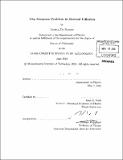The measure problem in eternal inflation
Author(s)
De Simone, Andrea, Ph. D. Massachusetts Institute of Technology
DownloadFull printable version (11.02Mb)
Other Contributors
Massachusetts Institute of Technology. Dept. of Physics.
Advisor
Alan H. Guth.
Terms of use
Metadata
Show full item recordAbstract
Inflation is a paradigm for the physics of the early universe, and it has received a great deal of experimental support. Essentially all inflationary models lead to a regime called eternal inflation, a situation where inflation never ends globally, but it only ends locally. If the model is correct, the resulting picture is that of an infinite number of "bubbles", each of them containing an infinite universe, and we would be living deep inside one of these bubbles. This is the multiverse. Extracting meaningful predictions on what physics we should expect to observe within our bubble encounters severe ambiguities, like ratios of infinities. It is therefore necessary to adopt a prescription to regulate the diverging spacetime volume of the multiverse. The problem of defining such a prescription is the measure problem, which is a major challenge of theoretical cosmology. In this thesis, I shall describe the measure problem and propose a promising candidate solution: the scale-factor cutoff measure. I shall study this measure in detail and show that it is free of the pathologies many other measures suffer from. In particular, I shall discuss in some detail the "Boltzmann brain" problem in this measure and show that it can be avoided, provided that some plausible requirements about the landscape of vacua are satisfied. Two interesting applications of the scale-factor cutoff measure are investigated: the probability distributions for the cosmological constant and for the curvature parameter. The former turns out to be such that the observed value of the cosmological constant is quite plausible. As for the curvature parameter, its distribution using the scale-factor measure predicts some chance to detect a nonzero curvature in the future.
Description
Thesis (Ph. D.)--Massachusetts Institute of Technology, Dept. of Physics, 2010. Cataloged from PDF version of thesis. Includes bibliographical references (p. 120-130).
Date issued
2010Department
Massachusetts Institute of Technology. Department of PhysicsPublisher
Massachusetts Institute of Technology
Keywords
Physics.